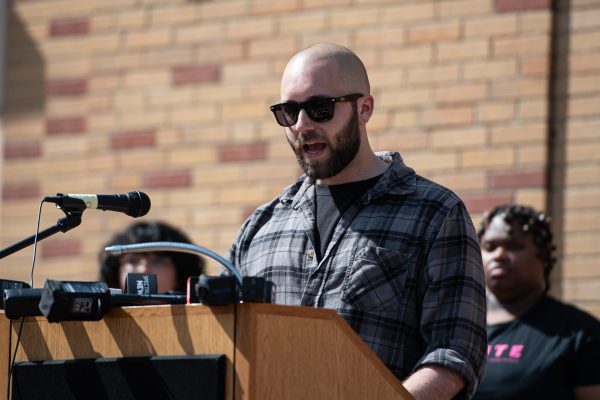SAS focuses on adaptive tools
October 20, 2006
Student Accessibility Services has opened up a new type of computer lab this semester.
Mollie Miller, adaptive technology coordinator for SAS, said the adaptive technology lab contains two embossers (braille printers), a refreshable braille keyboard, a close-captioned television, a scanner, and several software titles that enable students to have computers interact with their homework assignments.
Miller said much of the equipment was originally purchased with a grant received by the Trumbull campus, but that the technology was underutilized and eventually donated to the Kent campus.
An example Miller gave of how the lab will be utilized concerned students who have a disability preventing them from using a regular textbook.
Miller said an e-text reader from IntelliTools, Inc., is used to convert a textbook into an audio computer file. The textbook is stripped of its binding, scanned into a computer, and then inserted into the e-text software, which is able to transform text into sound.
Sophomore exploratory major Mike Moore said he often listens to books as he walks around campus.
Moore said: “A book port is like a blind man’s iPod. It will read any thing in the Microsoft Word format.”
Another aspect of the lab is the braille display, which works like a keyboard.
“Just last week I figured out how to use a braille display,” Moore said. “Whatever is on the computer screen is made readable (transformed into braille).”
Other aspects of the lab aren’t so high-tech.
Miller demonstrated an embossed map of the United States and diagram of a blood transfusion created for blind students.
Miller said while much of the technology in the lab will help students with disabilities, all students should feel welcome to come and check it out.
“I think it would be good,” Moore said. “People across the university should see it. It would allow people to see how people with disabilities use software to help with their academics. Just so long as they all don’t come at once.”
“My goal is to get students excited about technology, and to enhance their learning,” Miller said. “If a student can’t afford the software, I would encourage them to come use it at the lab.”
Miller said that adaptive technology is often a precursor to mainstream technology, and said it’s another reason all students should be interested in the lab.
“Technology is going toward voice recognition,” Miller said. “Right now, software allows students to say a Web site’s name, and the browser will go to that site. Or, software that allows students to say ‘ALT-F save’ and the software will save what they’re working on.”
Moore expressed excitement about the future of adaptive technology.
“There’s so much out there,” he said. “It’s impossible to know everything that’s out there.”
Contact student affairs reporter Matt White at [email protected].























